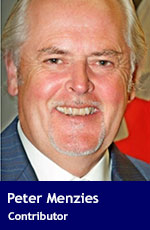 It sounds a little bit like a Jack London novel but it’s true: I was sitting in the bar of the Gold Rush Inn in Whitehorse one day with a buddy when the barmaid asked what two old birds like us were doing in town.
It sounds a little bit like a Jack London novel but it’s true: I was sitting in the bar of the Gold Rush Inn in Whitehorse one day with a buddy when the barmaid asked what two old birds like us were doing in town.
Looking around and being careful not to be overheard, we confessed that we worked for the Canadian Radio-television and Telecommunications Commission (CRTC) – not something you generally say out loud, particularly in the Land of the Midnight Sun.
“Are you the guys who opened the North up to competition?” she asked, much to our surprise.
We exchanged nervous glances and hesitantly replied, “Uh, ya, that’s us.”
Beaming with delight, she leaned over the bar, said “Thank you” and planted a kiss on my travelling companion’s cheek.
That’s one of the better stories I’ve about the commission. I use it not to illustrate how easy it is to make a pair of older gentlemen blush in a Yukon pub but to highlight the fact that there are some places in the country where communications policies aren’t taken for granted.
The largest part of that is the North, where about 113,000 Canadians are scattered across a frozen landscape about the size of western Europe. More than half the population – which is about one person for every 31 square km – is Indigenous. There are 12 official languages from Inuktitut to Dene, English and French.
Its communications infrastructure ranges from the Alaska border in the west to the North Atlantic off the coast of Baffin Island and from 60 to 83 degrees latitude. That’s the same distance as the United States between the southern tip of Florida and the 49th parallel. There are only about four roads – two including a seasonal ice road through Alberta to the Northwest Territories, one connecting Yukon to the Pacific coast at Skagway and the Alaska Highway south to B.C.
Its needs are enormous but when it comes to serving them, no one outside of the North really cares. Not when there are fights to be settled over whether 100 mbps Wi-Fi is available in vote-rich condo buildings in Toronto and Vancouver.
Those inside the territories – governments, consumers, Northwestel, SSI Micro and a handful of others – care a lot.
The entire North will now be looking to the CRTC’s newest commissioner, Claire Anderson, to be its champion – whether she and the CRTC like it or not. Her appointment as the B.C.-Yukon regional commissioner was announced on July 5.
A lawyer, she is also a citizen of the Taku River Tlingit First Nation and on all the kind of boards an ambitious young person should be on. She is obviously smart and articulate.
She will be shocked to learn that CRTC commissioners are expected to do very little these days. Over the past decade, assignments to hearings have declined from six to eight annually to maybe one or two. Or less. There’s scant evidence that travel within their regions to gain awareness of issues or consumer perspectives is a priority. More and more decisions are paper processes essentially made by staff.
It would be tragic if the opportunity Anderson represents to the commission is wasted.
Hopefully, the absurd insistence upon commissioners living within 100 km of the regional office (in this case, Vancouver) has been tossed aside. Both the North and the commission badly need a member who lives in the North.
So they better give her more to do – and money to do it – rather than take a seven-hour journey each way to Ottawa five or six times a year in order to be put on display at a two-hour meeting.
Yes, some will criticize her appointment by noting she hasn’t a lick of experience in either the broadcasting or telecommunications worlds.
But she’ll definitely know the issue that matters: if southern Canada really wants to declare itself #wethenorth, it better get off its entitled urban backside and give the North the sort of modern communications network the United States gives Alaska and Denmark gives Greenland. Now.
Peter Menzies is a former newspaper publisher and vice-chair of the CRTC, and advises tech companies on regulatory policy (the views here are his own).
The views, opinions and positions expressed by columnists and contributors are the author’s alone. They do not inherently or expressly reflect the views, opinions and/or positions of our publication.



